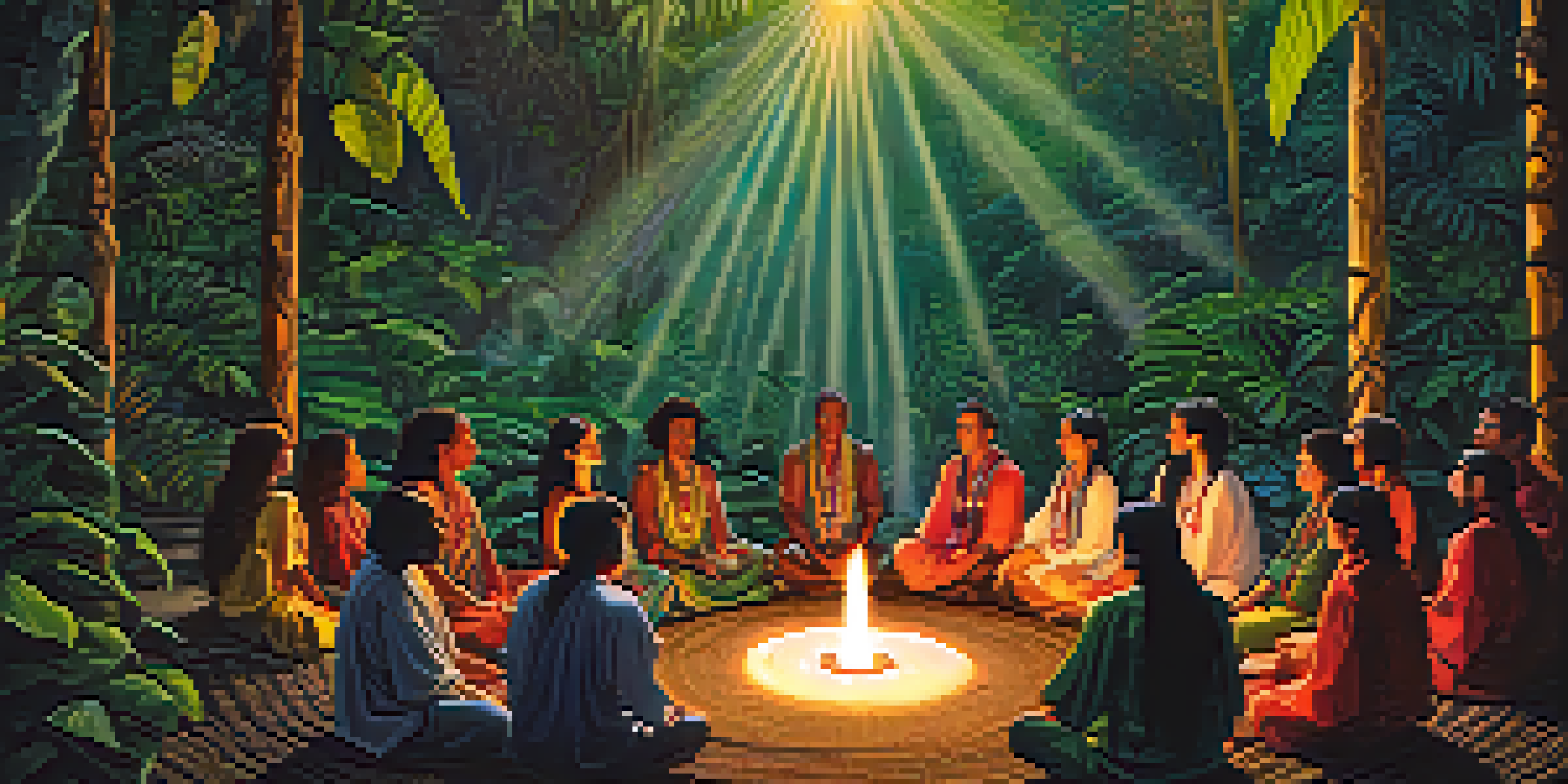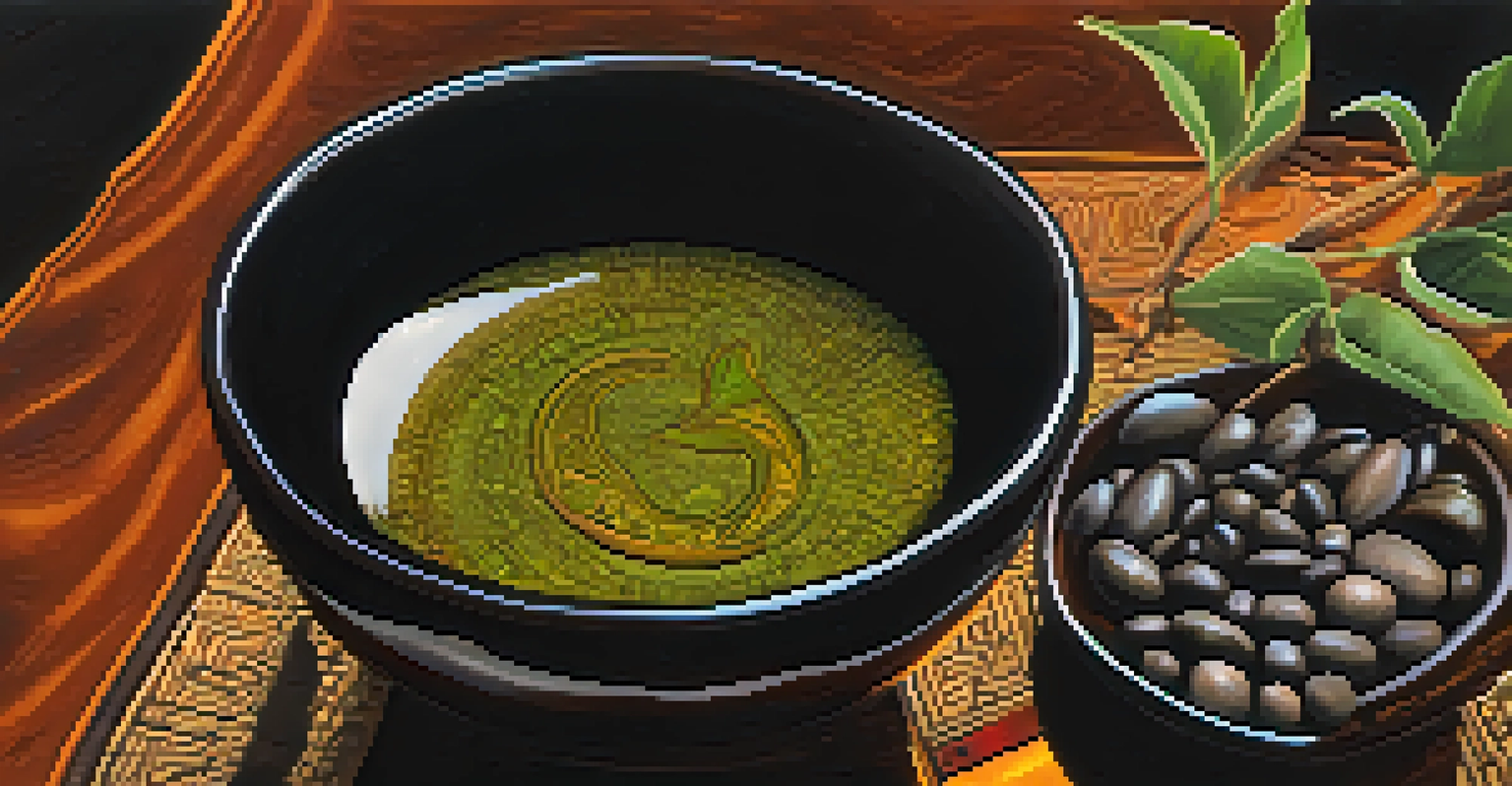Western Adaptations of Ayahuasca: From Amazon to Urban Settings

Understanding Ayahuasca: Its Roots and Cultural Significance
Ayahuasca, a powerful brew made from the Banisteriopsis caapi vine and other plants, has been used for centuries by indigenous tribes in the Amazon for spiritual and healing purposes. It's more than just a drink; it's a sacred ritual that connects participants to their ancestors and the spiritual realm. The ceremony is often led by a shaman, who guides the journey through the experience.
The experience of ayahuasca is a mirror that reflects back your own consciousness, showing you what you need to see.
In its traditional context, ayahuasca serves as a tool for introspection, allowing individuals to confront their fears and traumas. The visions induced by the brew can lead to profound insights, making it an essential part of healing practices in many indigenous cultures. This deep-rooted significance sets the stage for its later adaptations in various contexts.
As awareness of ayahuasca’s potential benefits spread beyond the Amazon, a growing number of Western seekers became curious about this ancient medicine. While it offers transformative experiences, understanding its cultural importance is crucial for respectful engagement and appreciation of its origins.
The Rise of Ayahuasca in Western Culture
The past few decades have seen a surge in interest in ayahuasca among Westerners, often fueled by a quest for alternative healing and spiritual experiences. Popular books, documentaries, and retreats have introduced ayahuasca to a broader audience, highlighting its potential for personal growth and mental health benefits. This newfound fascination has led to a growing number of ayahuasca retreats in various urban settings.

However, this rise has sparked debates about cultural appropriation and the commercialization of indigenous practices. Many argue that the spiritual and communal aspects of ayahuasca are being overshadowed by profit-driven motives. It's essential to navigate this interest with sensitivity, ensuring that the voices and traditions of indigenous peoples are respected and honored.
Cultural Roots of Ayahuasca
Ayahuasca is a sacred brew with deep cultural significance among Amazonian tribes, traditionally used for spiritual healing and introspection.
As people flock to urban centers for these experiences, there’s a pressing need for education on the ethical considerations surrounding ayahuasca use. Understanding the delicate balance between seeking healing and respecting cultural heritage is vital for those embarking on this journey.
Urban Retreats: A New Environment for Ayahuasca Experiences
In urban settings, ayahuasca retreats have popped up like trendy cafes, offering experiences that mimic traditional ceremonies but often lack their cultural context. These retreats can range from luxurious settings to more rustic environments, appealing to a variety of seekers. The convenience of accessing ayahuasca in cities makes it an attractive option for those unable to travel to the Amazon.
Ayahuasca is a sacred medicine that requires respect and understanding of its origins and cultural significance.
While these urban retreats may provide a transformative experience, they often come with risks. The lack of trained shamans and a proper understanding of the brew can lead to misunderstandings or even dangerous situations for participants. It’s crucial for seekers to do their research and choose retreats that prioritize safety and authenticity.
Moreover, the setting itself can influence the experience. Urban distractions may detract from the introspective journey that ayahuasca is meant to facilitate. Therefore, participants should consider how the environment might affect their spiritual experience and healing journey.
The Role of Shamanism in Urban Ayahuasca Ceremonies
Shamanism plays a pivotal role in traditional ayahuasca ceremonies, providing guidance and ensuring a safe environment for participants. In many urban retreats, however, the presence and qualifications of shamans vary widely. Some retreats may hire individuals claiming to have shamanic training, while others might lack any genuine connection to indigenous practices.
This discrepancy raises questions about authenticity and the potential for exploitation. Participants should seek retreats that prioritize hiring trained shamans who respect the traditions and ethics of the practice. A knowledgeable shaman can help navigate the complex emotions and visions that arise during the experience, offering essential support.
Rise of Urban Ayahuasca Retreats
The increasing popularity of ayahuasca in urban settings raises concerns about authenticity and the risk of cultural appropriation.
Ultimately, the quality of guidance can significantly influence the outcome of the ayahuasca journey. When participants connect with genuine shamans, they are more likely to experience the profound healing and insights that ayahuasca has to offer.
Synthetic Alternatives: The Rise of Ayahuasca Analogues
As ayahuasca's popularity grows, so too do synthetic alternatives aiming to replicate its effects. These substances, often marketed as ‘ayahuasca analogues,’ can be found in various forms, from capsules to powders. While they may promise similar experiences, they often lack the deep cultural and spiritual context that traditional ayahuasca offers.
This trend poses a challenge for those seeking genuine healing experiences. Synthetic alternatives can lead to unpredictable side effects, and their long-term impacts on mental health are still largely unknown. Moreover, their commercialization raises ethical concerns about commodifying a sacred practice.
For seekers, it's crucial to differentiate between genuine ayahuasca experiences and these synthetic copies. Understanding the origins and effects of these alternatives can help individuals make informed decisions about their spiritual and healing journeys.
Integrating Ayahuasca Experiences into Daily Life
After an ayahuasca experience, many participants find themselves grappling with the challenge of integrating profound insights into their everyday lives. The clarity gained during the journey can feel overwhelming when faced with the realities of modern life. Therefore, finding ways to incorporate these lessons into daily routines is essential for personal growth.
Some individuals turn to practices like journaling, meditation, or therapy as tools for integration. Sharing experiences with supportive communities can also provide a sense of belonging and understanding. These practices can help bridge the gap between the spiritual insights gained during ceremonies and the practicalities of daily living.
Ethics of Ayahuasca Use
Engaging with ayahuasca requires awareness of ethical considerations to respect its indigenous roots and avoid commodification.
Ultimately, successful integration can enhance overall well-being and foster a deeper connection to one's purpose. It transforms short-lived experiences into lasting change, allowing participants to live more authentically and consciously.
Ethical Considerations Surrounding Ayahuasca Use
As ayahuasca continues to gain popularity in the West, ethical considerations become increasingly important. Issues of cultural appropriation, exploitation, and the commodification of indigenous practices are at the forefront of these discussions. Participants should be mindful of the origins of ayahuasca and the cultural significance it holds.
Choosing retreats that honor and respect indigenous traditions can help mitigate potential harm. Engaging with practitioners who have genuine ties to the culture helps ensure that the benefits of ayahuasca are shared responsibly. It's crucial to support those who are committed to preserving the integrity of this sacred medicine.

In navigating these ethical waters, seekers can foster a more respectful relationship with ayahuasca. By prioritizing education and cultural awareness, individuals can contribute to a more ethical landscape that honors the roots of this powerful plant medicine.